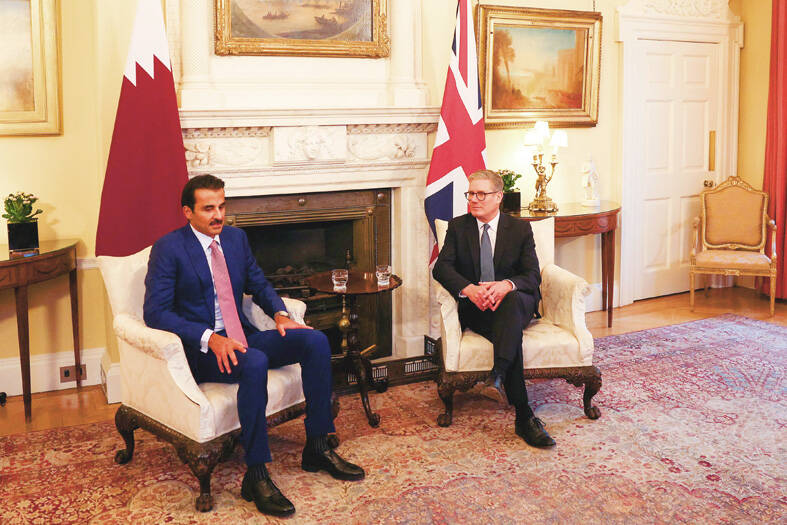British Prime Minister Keir Starmer began a multi-day visit to the Gulf yesterday, his first trip to the region since taking office, seeking stronger economic and defense ties with the United Arab Emirates (UAE) and Saudi Arabia.
The UK government in a statement on Saturday said Starmer aims to boost investment and deepen defense and security partnerships, describing the two Middle Eastern countries as “some of the UK’s most vital modern-day partners.”
Starmer, elected to lead the world’s sixth-largest economy in July, arrived in the UAE yesterday, where he is due to hold talks with UAE President Sheikh Mohamed bin Zayed Al Nahyan today. He would fly to Saudi Arabia later on the same day to meet Saudi Crown Prince Mohammed bin Salman.

Photo: Reuters
Starmer would also be looking to repair relations between the UK and UAE that soured under the previous Conservative government after an Abu Dhabi-backed bid to buy the Telegraph newspaper failed.
Stability in the Middle East is expected to be “high up the agenda” during the visit, including the pressing need for a ceasefire between Israel and Gaza, the release of all hostages and the urgent acceleration of aid into Gaza, the statement added.
“There is huge untapped potential in this region,” Starmer said, who is aiming to secure investment from wealthy Gulf states to help fund his mission to rebuild the UK’s aging infrastructure and shift to cleaner energy.
“I will be making the case to accelerate progress on the Gulf Cooperation Council (GCC] Free Trade Agreement, deepen our research and development collaboration and partner on projects of the future,” he added.
The government counts both Gulf monarchies as major investors, with trade between the UK and the UAE worth £23 billion (US$29.3 billion) and that with Saudi Arabia estimated at £17 billion.
British trade ministers visited the region in September to try to advance free trade deal talks with the GCC, which also includes Bahrain, Kuwait, Oman and Qatar. Such a deal is estimated to increase bilateral trade by 16 percent and potentially add £8.6 billion a year in the long run.
Qatari Emir Sheikh Tamim bin Hamad Al Thani was in the UK for a state visit last week, where he was welcomed by British King Charles and Starmer in a show of ceremonial pageantry. The trip ended with the two countries pledging to bolster their investment relationship.
Starmer is scheduled to travel to Cyprus to meet Cypriot President Nikos Christodoulides tomorrow, the first bilateral visit by a UK leader to the Commonwealth country in more than five decades, to discuss closer cooperation on shared security challenges in the region, the statement added.
The Gulf visit would be Starmer’s 15th international trip since he entered Number 10 on July 5.
Opponents have criticized the amount of time he has spent out of the country, but allies insist the trips have been vital to get to know other world leaders.
Starmer, 61, has been insisting in capitals that “Britain is back on the world stage” following rancor over its departure from the EU.

Incumbent Ecuadoran President Daniel Noboa on Sunday claimed a runaway victory in the nation’s presidential election, after voters endorsed the young leader’s “iron fist” approach to rampant cartel violence. With more than 90 percent of the votes counted, the National Election Council said Noboa had an unassailable 12-point lead over his leftist rival Luisa Gonzalez. Official results showed Noboa with 56 percent of the vote, against Gonzalez’s 44 percent — a far bigger winning margin than expected after a virtual tie in the first round. Speaking to jubilant supporters in his hometown of Olon, the 37-year-old president claimed a “historic victory.” “A huge hug

Two Belgian teenagers on Tuesday were charged with wildlife piracy after they were found with thousands of ants packed in test tubes in what Kenyan authorities said was part of a trend in trafficking smaller and lesser-known species. Lornoy David and Seppe Lodewijckx, two 19-year-olds who were arrested on April 5 with 5,000 ants at a guest house, appeared distraught during their appearance before a magistrate in Nairobi and were comforted in the courtroom by relatives. They told the magistrate that they were collecting the ants for fun and did not know that it was illegal. In a separate criminal case, Kenyan Dennis

A judge in Bangladesh issued an arrest warrant for the British member of parliament and former British economic secretary to the treasury Tulip Siddiq, who is a niece of former Bangladeshi prime minister Sheikh Hasina, who was ousted in August last year in a mass uprising that ended her 15-year rule. The Bangladeshi Anti-Corruption Commission has been investigating allegations against Siddiq that she and her family members, including Hasina, illegally received land in a state-owned township project near Dhaka, the capital. Senior Special Judge of Dhaka Metropolitan Zakir Hossain passed the order on Sunday, after considering charges in three separate cases filed

APPORTIONING BLAME: The US president said that there were ‘millions of people dead because of three people’ — Vladimir Putin, Joe Biden and Volodymyr Zelenskiy US President Donald Trump on Monday resumed his attempts to blame Ukrainian President Volodymyr Zelenskiy for Russia’s invasion, falsely accusing him of responsibility for “millions” of deaths. Trump — who had a blazing public row in the Oval Office with Zelenskiy six weeks ago — said the Ukranian shared the blame with Russian President Vladimir Putin, who ordered the February 2022 invasion, and then-US president Joe Biden. Trump told reporters that there were “millions of people dead because of three people.” “Let’s say Putin No. 1, but let’s say Biden, who had no idea what the hell he was doing, No. 2, and